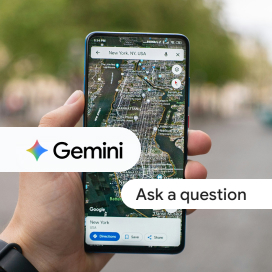Written by Alberto Fernández
Index
Since its emergence in 1998, Google has continued to expand, transforming from a simple search engine into a true giant of the web ecosystem.
It dominates online searches in text format, but also in video, as it owns YouTube, and it controls a large part of the digital advertising business. Its operating system Android is present on over 70% of the world’s smartphones, its browser, Google Chrome, is the most popular among users, and its artificial intelligence, Gemini, is in a tight race with OpenAI to lead this game-changing technology.
However, great power comes with great responsibility: Google is under the scrutiny of governments, the media, and competitors worldwide. Antitrust lawsuits, investigations for abuse of dominant position, and regulations from Europe…
Today we’ll talk about the most important trial against Google to date: the lawsuit filed by the U.S. Department of Justice against Google for monopolistic practices in its search engine.
You’ve probably read about this case in various media outlets, but are you up to date on its current status? And more importantly, do you know how its outcome could affect your site’s visibility and your web traffic revenues?
Trial background
In August 2024, the judge ruled that Google illegally maintains a dominant position in search and related advertising. Now, the only thing left to decide is what specific measures must be implemented to limit this dominance.
Among the proposals from the U.S. Department of Justice, the most prominent is that Google should divest either Google Chrome or the Android operating system, selling one or even both as independent businesses.
Alternatively, Google could be required to share key algorithm data with other search engines, along with other less significant obligations.
The decision on these measures is expected to be made public in August 2025.
Possible consequences of the antitrust trial against Google
The sale of Google Chrome
Let’s start by analyzing the impact that the sale of Chrome could have on the search engine (a sale for which powerful candidates like OpenAI have already expressed interest, though we currently find it unlikely to go through).
Loss of data
Chrome plays a major role in Google’s search algorithm because Google uses anonymous data from Chrome users to gather real-world metrics related to user experience, which directly impact website rankings. If Chrome is sold, Google would have to negotiate commercial agreements to retain this information, which would likely be more limited — potentially benefiting small and medium-sized site owners who often lack sufficient real user data.
This change shouldn’t drastically affect our sites, as Google could still secure data through services like Search Console, Analytics, Tag Manager, and Android WebView. Also, Core Web Vitals could always be calculated using lab data if real-user data is unavailable.
Loss of market share
However, a new window would open for other search engines to negotiate with Chrome’s new owner to become the default search engine, possibly reducing Google’s market share. In Europe, the impact might be smaller, since a mandatory search engine choice screen (Choice Screen) was implemented in March 2024. A year later, browsers like Aloha and Firefox have reported slight usage increases in the region.
Many have predicted the end of Google before — following the Microsoft-OpenAI partnership or due to Apple users adopting alternative AI search engines — yet, Google has never truly been under serious threat. Bing has barely scratched 1% of the market share, and just days ago, Google boasted about the health of its search engine and the growth in search queries.
However, the sale of Chrome could truly dent Google’s market share, especially outside of Europe. This could lead to both positive and negative changes in organic traffic, depending on how well our sites adapt to these “new” search engines.
Google Discover
Lastly, Google Discover might also be affected, as Chrome’s new owner could auction off the feed space or let users choose their default feed (already required in Europe), giving a chance to alternatives like Microsoft Start, Brave News, and others. For media outlets, this new landscape could be worth adapting to.
If advertisers don’t migrate, fewer impressions could actually increase CPM, meaning our revenue might remain unaffected by a potential Discover drop.
The sale of Android
Another possible (though less likely) outcome is the sale of Android, including its launcher, search bar, and OEM agreements. This could lead to several consequences.
Loss of distribution channel
If Google loses its main mobile distribution channel, its search engine would likely lose market share.
As with Chrome, Android’s new owner could strike deals with other search engines to set them as the default.
In January, researchers from Stanford, MIT, and the University of Pennsylvania published a study showing that, while Google claims Chrome’s success is due to quality, its advantage mainly comes from exposure.
In the study, users were paid to use Bing instead of Google for two weeks. A third kept using Bing afterwards, suggesting that if users were given the opportunity to try other search engines, many might never return to Google.
OEM agreements
Android OEMs could also be more free to preinstall search widgets from other providers, without violating exclusivity clauses — further contributing to a fragmented search engine market.
Discover integration
Without control over Android, Google would also lose the ability to integrate its content feed into the OS, affecting Google Discover.
Still, this likely wouldn’t drastically reduce Discover traffic. Google still has the Google App, and even if Android’s new owner changes the feed, users could easily download the app they’re used to.
Sharing data with competitors
The third and most likely consequence would be requiring Google to share key algorithm data with competitors.
If implemented, this would be like playing with your opponents’ cards visible. It could be a huge opportunity to boost site visibility, but also a risk if you fail to adapt quickly, as everyone would see the same cards.
To be clear, Google wouldn’t need to disclose its source code, but it might need to publicly document (or license access to) which ranking factors it uses, including approximate weights or thresholds.
But knowing the “cards” isn’t the same as knowing how to play them. These factors often interact. Understanding one in isolation doesn’t mean understanding the full outcome. Knowing the cards is one thing — playing them well is another.
In this context, having a strong SEO agency would become even more critical. Interpreting this data and turning it into a competitive advantage would require experience, technical know-how, and a long-term strategic vision.
Other corrective measures being considered
Besides these three major options, the Department of Justice has proposed several smaller-scale measures that could also impact our websites:
- Ban on default search engine exclusivity agreements. The DOJ seeks to eliminate contracts through which Google pays Apple, Samsung, and others to set Google as the default search engine. This could increase competitors’ market share, requiring us to diversify SEO strategies for other engines like Bing.
- Expanded search choice screens. Similar to Europe, the DOJ proposes implementing a Choice Screen in the U.S., allowing users to pick their preferred search engine during setup. Unless paired with other actions, this measure alone is expected to have minimal impact, as most users still choose Google.
- Independent algorithm audits. Another proposal is to assign an independent auditor to review Google’s algorithm updates, ensuring fairness and transparency. The impact on our sites remains to be seen, but it could reduce uncertainty about updates.
Predictions for what may happen
While it’s hard to predict the court’s decision, we’ll attempt a forecast.
First, it’s unlikely (though not impossible) that the judge will order extreme measures like a complete sale of Chrome or Android. If it happens, we believe Chrome would be sold before Android, as the company impact would be less severe.
In other high-profile cases — Microsoft in 2002, and more recently AT&T/Time Warner, Meta/Giphy, Google Shopping — authorities have typically avoided radical solutions.
The technical complexity, potential harm to consumers, and likely appeals reduce the odds of drastic measures.
Instead, restrictions on exclusivity and global implementation of Choice Screens seem far more likely. These would force Google to compete more fairly while keeping its dominant role.
It’s also plausible that Google will be required to share search algorithm data, though likely limited to basic factors, citing trade secrets and privacy.
Finally, it’s very likely that an independent auditor will be appointed to monitor Google regularly, as is common in similar cases.
In short, we expect stricter competition rules, but Google will remain dominant — though with a slight market share drop (under 20%) and reduced advantage over rivals. SEO for Google will remain essential, but it’s crucial to begin embracing multi-engine SEO and double down on technical optimization and user experience. Those who adapt early won’t just survive the shift — they’ll lead it.



